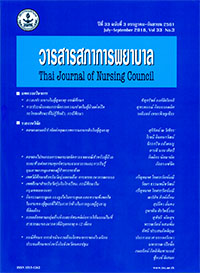Nutrition-Promoting Work at a Primary School in Nakhon Pathom Province
Keywords:
Nutrition, Healthy kids healthy food project, SchoolAbstract
Objective: To describe the work process, success and obstacles in the development of
nutrition and health among students, in Bandongkate school.
Design: Case study
Procedure: The participants included core-team students and members, instructors,
administrators, parents, food sellers, educational committee and the local government.
Through purposive sampling, 18 participants from Healthy Kids, Healthy Food (Dek Thai
Kam Sai) Project were selected. Data were collected using interview, observation, and feld
note with a follow up for data collection. Data were analyzed using content analysis.
Results: The school had work process in nutrition through planning that was integrated
with the Suffcient Economy Project existing in the school. An emphasis was on extending
poultry farm along with the development of the student cooperation system to deliver raw
products to the school lunch program. Success factors included the policy on health promotion
support that was clearly communicated and the staff included administrators, staff at all levels,
school networks, community and local government with their participation in students’ nutrition
and health promotion. In addition, the school provided learning environments for students
through resource utilization in the community and the integration of courses with eight activities
consisting of; farming, student cooperation, food services, monitoring nutritional status, developing
healthy habits, healthy environment, health services, and learning activities for agriculture,
nutrition, and health. The problems and obstacles were limited farming areas in the school and
discontinuity of information transfer when the responsible instructor moved.
Recommendation: The results revealed approaches to community participation and
integration of networking for learning environment in nutrition, leading to proper nutritional
status and quality of life among students, resulting from success and sustainable development.
Downloads
References
2. Ministry of Public Health. Bareau of Non Communicable Disease. Department of disease control. Annual Report
2015. Bangkok: The War Veterans Organization of Thailand under Royal Patronage of His majesty the King; 2016.
3. World Health Organization. Global status report on noncommunicable diseases 2010. Geneva: World Health Organization; 2011.
4. Department of health. The Department of Health, revealed the Thai children problem, are seeking out 7 organizations to develop health learning packages [Internet]. 2014 [cited 2014 Jan 6]. Available from: https://www.anamai.moph.go.th/ewt_news.php…
5. Department of health. Nutritional situations[Internet]. 2015 [cited 2017 Oct 5]. Available from: https:// nutrition.anamai.moph.go.th/main.php…
6. Health Promotion Division. Direction, Target and Strategic Phase 10 years (2012-2021). Bangkok: Thai Health Promotion Foundation; 2012.
7. Department of health. Department of Health planning for network expansion of Thai children Project to
reach 5400 children in year 2017. [Internet]. 2012 [cited 2015 Mar 2]. Available from: https://www. anamai.moph.go.th/ewt_w3c/ewt_news.php? nid=7797
8. Uengchusak C. Sugar health and proper consumption management. Bangkok: The War Veterans Organization of Thailand Under Royal Patronage of His majesty the King; 2012.137
9. Health Promotion Division. Risk near Thai children…. Fat from school[Internet]. 2013 [cited 2015 July 11]. Available from: https://www.thaihealth.or.th/…/16408-ภัยประชิดเด็กไทย%20อันต…
10. Department of health. Manual of classifcation to food, desserts and beverages according to the standard of nutrition (2nd ed.). Bangkok: Offce of National Buddhism Press; 2014.
11. Toathom R. Factors Relating to After-School Dietary Behavior of Students in Bangkok Noi District[The study for the Master of Arts Major Field/Human and Community Resource Development, Faculty of Education and Development Sciences]. Bangkok: Kasetsart University, Kamphaeng Saen Campus; 2015.
12. Glomjai T, Teinchaitut C, Sangartit S, Sihapark S, and Promsaka na Sakolnakorn P. The Collaboration of the Stakeholders in Community to Prevent the Alcohol Consumption Behavior of Young People in Thailand. Journal of The Royal Thai Army Nurses 2016; 17: 141-148.
13. Health Promotion Division. (2014). Thailand: healthy kids, healthy foods (Dek thai kam sai) Project [Internet]. 2014 [cited 2014 Nov 1]. Available from: https://www.pepgtakesa2.com/pgq56/fles/240757.pdf
14. Wirawat N. School food and nutrition management model followed by Her Royal Highness Princess Maha Chakri Sirindhorn. The Princess Mother: Development of nutrition, nutrition and health in schools. Bangkok: The War Veterans Organization of Thailand Under Royal Patronage of His majesty the King; 2012.
15. Tantisirin K. Ministry of Public Health Join the party Dek Thai Kam Sai Project takes care of Thai children’s health thoroughly[Internet]. 2014 [cited 2016 Dec
4]. Available from: https://www.thairath.co.th/content/458439
16. McLeroy KR, Bibeau D, Steckler A, Glanz K. An ecological perspective on health promotion programs. Health Education Quarterly 1988;15(4):351-77.
17. Donabedian A. An Introduction to Quality Assurance in Health Care. Oxford: Oxford University Press; 2003.
18. Piaseu N. Concepts of nutritional care for Non Communicable Diseases and applications. In Piaseu (editor). Nutritional care for controls of noncommunicable diseases in community. Bangkok:Jud thong printing; 2018.








